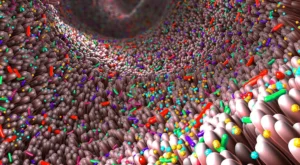Ross Pelton, RPh, PdD, CCN
June 16, 2021
Postbiotic Metabolites: Exploring the Evolving Science of the Gut Microbiome
By Ross Pelton, RPh, PdD, CCN
Scientific Director, Essential Formulas
Introduction: A New Chapter in Microbiome Research
The human gut microbiome—comprising trillions of microorganisms—plays a vital role in digestion, nutrient synthesis, and overall physiological balance. Recent scientific advances have shifted attention toward postbiotic metabolites: bioactive compounds produced by beneficial bacteria during fermentation. These metabolites are gaining recognition for their potential to support various aspects of health and wellness.
Historical Foundations: From Pasteur to Metchnikoff
- Louis Pasteur pioneered microbial science, laying the groundwork for understanding fermentation and microbial activity.
- Elie Metchnikoff, often credited as the “father of probiotics,” hypothesized that fermented foods like yogurt contributed to longevity, based on observations in Bulgaria. His work inspired early interest in the relationship between diet, microbes, and health.
The Modern Microbiome Era
Advancements in genome sequencing—accelerated by the Human Genome Project—enabled the launch of the Human Microbiome Project. This initiative revealed that microbial genes vastly outnumber human genes, suggesting that microbial activity plays a significant role in human biology.
What Are Postbiotic Metabolites?
Postbiotic metabolites are small molecules generated when probiotic bacteria ferment dietary fibers and polyphenols. These compounds include:
- Short-chain fatty acids (SCFAs)
- B vitamins
- Organic acids
- Antimicrobial peptides
- Amino acids and antioxidants
Emerging research suggests these metabolites may help maintain microbial balance, support digestive function, and contribute to immune system modulation. However, their specific roles are still being studied, and no definitive health claims can be made without FDA evaluation.
Diet Diversity and Microbiome Support
A diverse diet rich in plant-based fibers and polyphenols is essential for nurturing beneficial bacteria. Studies show that microbial diversity is associated with overall wellness, while low diversity may correlate with certain imbalances. Incorporating a variety of fruits, vegetables, legumes, and fermented foods may help support a balanced microbiome.
Addressing the Fiber Gap
Many Americans fall short of recommended fiber intake. Increasing consumption of whole plant foods can help provide the substrates needed for beneficial bacteria to produce postbiotic metabolites. Educational tools like the “Salad Buzz” method—featuring a mix of fiber-rich vegetables—can inspire dietary variety.
Fermented Foods and Their Role
Fermented foods such as kimchi, sauerkraut, miso, and kefir contain live cultures and fermentation byproducts. While traditionally valued for their probiotic content, current research is exploring how postbiotic metabolites formed during fermentation may contribute to their perceived benefits.
Metabolomics and Metagenomics: Mapping Microbial Activity
- Metabolomics identifies and analyzes metabolites in biological systems.
- Metagenomics investigates microbial genes and their functions.
These fields are helping scientists understand how microbial communities interact with the human body, though much remains to be discovered.
Regulatory Note
Statements regarding the effects of probiotics, postbiotics, or fermented foods should not be interpreted as medical claims. These products are not intended to diagnose, treat, cure, or prevent any disease. Consumers should consult healthcare professionals before making dietary changes or using supplements.
The Gut-Brain Connection and Beyond
Preliminary studies suggest that microbial metabolites may influence gut-brain communication, immune signaling, and metabolic pathways. However, these findings are exploratory and require further clinical validation.
About Dr. Ohhira’s Probiotics®
Dr. Ohhira’s Probiotics® is a fermented food supplement produced through a multi-year fermentation process involving various plant-based ingredients and probiotic strains. The final product contains a complex mixture of fermentation byproducts, including postbiotic metabolites. While individual experiences may vary, the formulation is designed to support microbial diversity and digestive balance as part of a healthy lifestyle.
Supporting a Healthy Microbiome
To foster a balanced gut environment:
- Focus on a varied, plant-rich diet.
- Limit processed foods high in sugar and saturated fats.
- Consider fermented foods or supplements as part of a broader wellness strategy.
Final Thoughts
The science of postbiotic metabolites is still unfolding. As research progresses, consumers are encouraged to stay informed, prioritize dietary diversity, and consult qualified professionals when exploring microbiome-supportive strategies.






